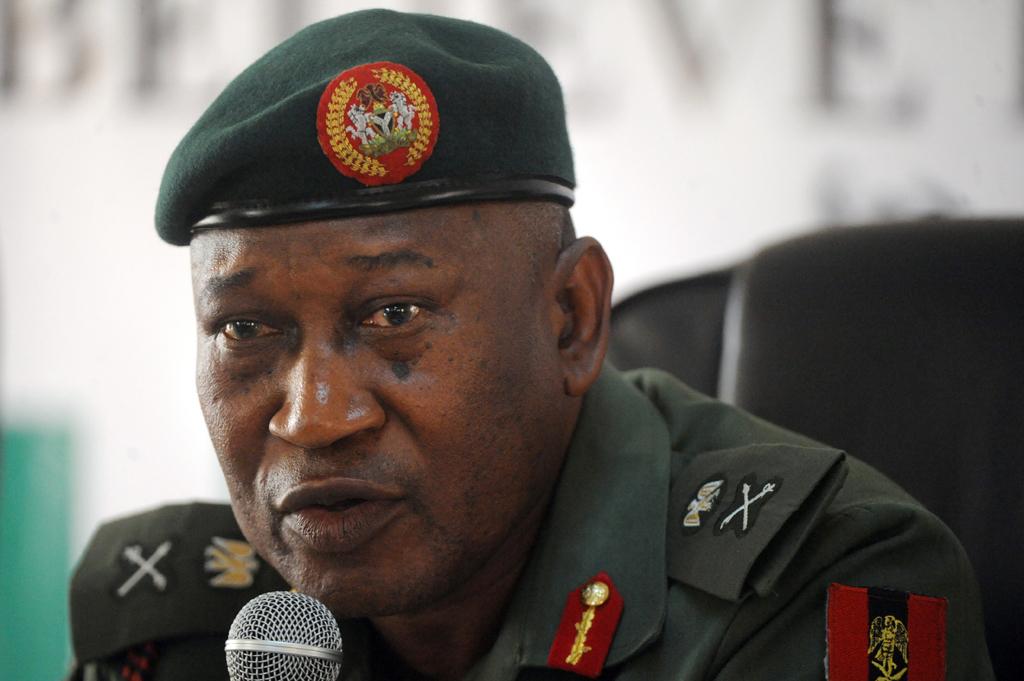Nigerian army intensifies the hunt for the missing girls
Nigerian defense spokesman Major-General Chris Olukolade in Abuja, May 9, 2014.
ABUJA, Nigeria — Nigeria's Army has posted two divisions to hunt for 200 schoolgirls abducted last month by Islamist rebels in an attack condemned by global leaders, including US first lady Michelle Obama on Saturday.
The soldiers are stationed in the border region close to Chad, Cameroon and Niger to work with other security agencies, said Gen. Chris Olukolade, Nigeria's defense spokesman.
The government of President Goodluck Jonathan has faced criticism for its slow response since Boko Haram militants stormed a secondary school in the village of Chibok, near the Cameroon border, on April 14, and kidnapped the girls, who were taking exams.
Fifty have escaped but more than 200 remain with the insurgents.
"The facilities of the Nigerian Army signals as well as all the communication facilities of the Nigerian Police and all the services have been devoted into coordinating this search," Olukolade said in a statement.
"The major challenge remains the fact that some of the information given here turned out in many occasions to be misleading …. Nevertheless, this will not discourage the collaborative efforts that are ongoing," he said.
The air force has flown more than 250 sorties, a signals unit and the police are involved and a multinational task force has also been activated and surveillance equipment is deployed in support of 10 search teams, he said.
The United States, Britain, France, China and international police agency Interpol have all offered assistance.
Jonathan on Friday said he believed the schoolgirls remained in Nigeria and have not been transported into Cameroon. It was the first indication he has given of their whereabouts.
The attackers were based in the Sambisa area of Borno state, a Boko Haram stronghold near the school from where the girls were abducted, he said.
Rare step
Michelle Obama took the rare step of delivering her husband President Barack Obama's weekly radio address on Saturday to express outrage over the kidnapping.
"Like millions of people across the globe, my husband and I are outraged and heartbroken over the kidnapping of more than 200 Nigerian girls from their school dormitory in the middle of the night," she said in the address.
"This unconscionable act was committed by a terrorist group determined to keep these girls from getting an education — grown men attempting to snuff out the aspirations of young girls," she said.
Boko Haram's fight for an Islamic state has killed thousands since it erupted in mid-2009 and has destabilized swathes of the northeast of Nigeria, Africa's top oil producer, as well as neighbors Cameroon and Niger.
The global outrage over the attack has shone a spotlight on the rebellion and institutional challenges faced by the government and military just as Nigeria's economy has overtaken South Africa's as the biggest on the continent.
Earlier this month, Boko Haram leader Abubakar Shekau threatened to sell the girls "in the market."
The kidnappings and a broader militant threat overshadowed the World Economic Forum held in the Nigerian capital this week that showcased investment and opportunity in the country of 160 million people.
Human rights group Amnesty International said in a statement, citing multiple interviews with sources, that the security forces had been warned more than four hours in advance of the school attack but did not do enough to stop it. Olukolade dismissed the report as baseless.
Additional reporting by Jeff Mason in Washington; Editing by Janet Lawrence
Every day, reporters and producers at The World are hard at work bringing you human-centered news from across the globe. But we can’t do it without you. We need your support to ensure we can continue this work for another year.
Make a gift today, and you’ll help us unlock a matching gift of $67,000!
